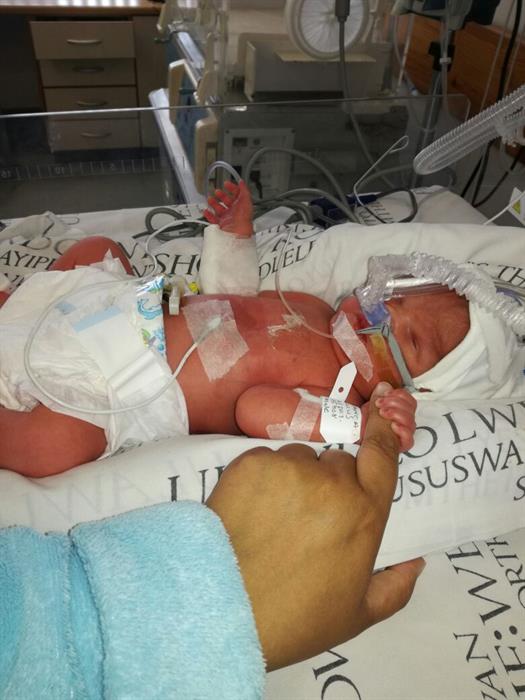Update
KNYSNA NEWS - World Prematurity Day is observed on 17 November each year to raise awareness of preterm birth and the challenges for these babies and their families worldwide.
One such case locally is that of Caleb Cornelius who was born at Knysna Provincial Hospital on 11 October at just 32 weeks, weighing 2.01kg.
The now six-week-old “miracle baby” has since been discharged from the hospital and is in the loving and watchful care of his doting parents Jason and Bianca Cornelius, after what they describe as “a long journey”.
Bianca says the overall experience has been overwhelming.
“I was scared and didn’t know what to expect. After giving birth, I could only give him a kiss and the nurses took him away.
"I only held him after four days, which was complete torture… I wanted to cry every day but I had to be strong for my baby and I drew strength from the nurses and my husband’s support.”
Only after six days was the emotional mother able to sleep close to her son.
“I was so excited, I was told I have to do kangaroo mother care (KMC): I had to put him on my chest, skin to skin, which I’m still doing today.
"Now I can’t move because that is the only place he wants to be, but I am not complaining! I love every minute of it.”
Nobody should ever have to go through this, Bianca says, but adds that if this were to happen, they should trust that their “little wonder” will get the best help from the nurses and doctors.
The World Health Organisation (WHO) estimates 15-million babies are born prematurely each year, making a substantial contribution to neonatal mortality rates.

Knysna Provincial Hospital’s tiny miracle, Caleb Cornelius, holds on tightly to his mother’s finger. Photos: Supplied
World Prematurity Day also aims to raise awareness of the causes and the ways to avoid preterm births.
According to Eden and Central Karoo district health spokesperson Nadia Ferreira, the main reasons associated with premature birth is idiopathic (relates to any disease or condition that arises spontaneously for which the cause is unknown), and maternal infection, hypertensive disorder and antepartum haemorrhage.
She says that more than three-quarters of premature babies can be saved with feasible, cost-effective care.
The Eden and Central Karoo region accounts for 10% of all preterm and low birth-weight babies born in the Western Cape, says Ferreira, and KMC until the baby weighs 2.5kg is a safe, alternative and effective method of caring for preterm infants, instead of using conventional incubators.
“From the moment the preterm baby is stable in the neonatal ward, KMC is introduced, first for short periods next to the closed incubator and then as the baby grows, to full-time kangaroo care.
"The mother’s body heat controls the baby’s temperature, providing heat, love and security,” says Ferreira.
Explaining this, she says closeness of the baby to the mother will stimulate breast milk production and the bonding between the baby and the mother has the added advantage of giving the mother the confidence to handle her tiny newborn.
The added nourishment from breastfeeding for the first six months also bodes well for the child’s health, Ferreira says.
Read a previous article: Knysna's tiny miracle
ARTICLE: NWABISA PONDOYI, KNYNSA-PLETT HERALD JOURNALIST
'We bring you the latest Knysna, Garden Route news'
















